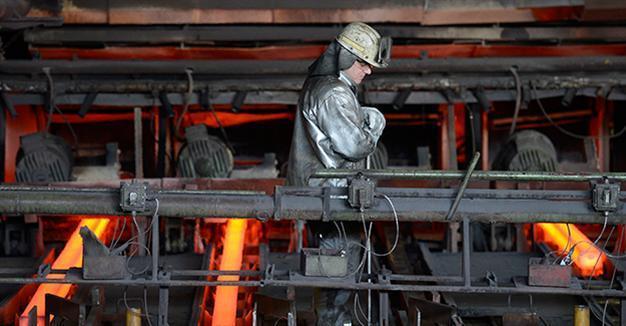German exports to Russia set to fall to 10-year low
BERLIN-Agence France-Presse

A worker stands between glowing steel at the plant of German steel company Arcelor Mittal in Hamburg in this March 25, 2013 file photo. ArcelorMittal, the world's largest steelmaker, launched plans on February 5, 2016 for a $3 billion (2.06 billion pound) share issue to help reduce debt and cut costs, having been hit by a plunge in steel prices which it blamed on a surge in cheap exports from China. REUTERS/Fabian Bimmer/Files
German businesses are expecting to see a further drop in exports to Russia this year to their lowest level in 10 years, even if companies continue to regard it as a market with enormous potential, a specialist trade organization found on Feb. 19.
German exports to Russia plummeted by 25.5 percent last year, weighed down by the plunging ruble and the economic crisis in Russia, according to data published by the Committee on Eastern European Economic Relations. “Compared with the record year in 2012, German exports to Russia have fallen by nearly half in the past three years from 38 billion euros ($42 billion) to 21 billion euros,” said Wolfgang Buechele, who heads the committee and is chief executive of industrial gases group Linde.
“And according to our estimates, exports will drop by around 10 percent this year and fall below the 20-billion-euro mark for the first time since 2006,” Buechele said.
“At the moment, Germany’s foreign trade is booming, helping to offset” the difficulties in Russia, said Rainer Seele, president of the German-Russian chamber of commerce and head of the Austrian oil and gas group, OMV.
But that might not always be the case, as the outlook for a number of emerging economies clouds over, he warned.
German businesses have been highly critical with regard to the economic sanctions slapped on Russia by the European Union. But they believe the wind will change and the outlook for the country will brighten this year. “Our Russian partners insist that cooperation with Europe has a different quality and reliability than with other partners,” Seele said.
Buechele and Seele were part of a delegation of German business leaders who met Russian Prime Minister Dmitry Medvedev on the sidelines of the Munich Security Conference last week.
At that conference, Medvedev said tensions between Russia and the West had sent the world into a “new Cold War.”
But the fact that Medvedev attended the Munich conference alone was a good sign, Buechele suggested, saying Russia was “holding out a hand” to Europe.
“Everywhere in Russia, we seeing and hearing the same signal: we’re re-opening ourselves again to Europe, to cooperation with German companies in particular,” said Seele.
“The German economy is ready and continues to see enormous potential” in Russia, he added.
